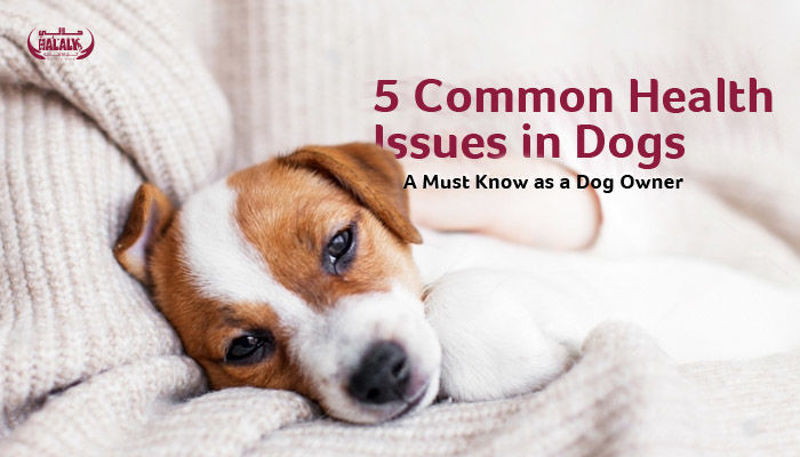Think of this scenario: It is a sunny day and you are having fun playing catch with your dog in the garden. The dog runs to you and you throw the ball stick or whatever else that he really enjoys and… Wait, why isn’t he hurrying to get it? You’ll explain it away and assume he just got tired. But after a few days now, something is off- he’s been eating only little, has visible discomfort and sleeps more than he plays!
You feel that something is wrong. What could it be?
Just like humans, dogs can also become ill for many reasons, some of which might be not so obvious. There is a wide range of problems they may suffer from.Whether it is a sore tooth or an underactive thyroid gland, it is important to be able to detect the signs and act early.
In this blog, we will outline the top 5 common health issues in dogs that every dog owner should know about and in most cases, how to keep your lovely puppy.
-
Obesity
The most common dog health problem that is fast rising amongst dog owners is obesity. Obesity causes a number of circumstances, including those associated with diabetic legs growing out of the joint conditions of bone disease and heart illness. The life of the dogs is so short and being overweight means they will die even earlier.
How to Manage It:
-
Do not forget to exercise regularly and provide healthy food.
-
Make sure to control portion sizes without over-eating.
-
If the dog cannot adhere to the ‘control’ diet then you ask a veterinarian for a more defined plan.
-
Dog Teeth Problems
Dental issues in dogs are often neglected and this can be very harmful to their general health. The dental diseases include but are not limited to gum disease and tooth cavities, and like most bacterial infections, these too can spread to the organs via blood and cause mass destruction.
Symptoms to Watch For:
-
Problems with eating and/or chewing.
-
Excessive salivation or bad breath.
-
Painful swelling or bleeding of gums.
Preventive Tips:
-
Cleaning your dog teeth with a standard toothpaste that has the approval of vetirinians.
-
Giving your dog plaque-reducing dental chews and toys.
-
Taking your dog for dental exams preiodically.
-
Thyroid Problems in Dogs
Hypothyroidism and other thyroid problems in dogs occur when the hormones are underactive and so the thyroid gland is unable to give the definite amount of these hormones. These symptoms include feelings of being cold, increase in body weight, sluggish metabolism and also a lot of skin complaints occur because of this abnormality.
Symptoms of Hypothyroidism:
-
Weight gain without explanation.
-
Balding or thinning fur.
-
Decreased activity or weakness.
Treatment:
Generally, hypothyroidism is managed with medication taken with the prescribed dose once diagnosed. Blood tests every few months will also be necessary with some of these medicines so that the hormone levels are such that your dog is being given the correct dosage of the medication.
-
Ear Infections
Dogs with floppy ears and those that are allergic are at risk of ear infections. These infections may be caused by bacterial, yeast, or parasite infection and lead to itching and redness among other things.
Ear Infection Symptoms:
-
Excessive head shaking or scratching at the ears, or any such.
-
Bad smell emanating from the ears.
-
Inflammation inside the ear canal.
How to Prevent It:
Use of vet-recommended ear cleaning solutions to thoroughly clean the ears on a routine basis.
Always ask for a vet consultation if you notice any change in your dog’s behaviour.
-
Arthritis
The larger breeds are the more likely to be affected by arthritis as the dog is getting older. This is a disease that affects the joint and is characterized by pain and stiffness of joints taht leads to limited motion.
Arthritis Signs:
Getting out of bed or going up staircases is a burden.
Walking becomes a problem with dragging limbs.
Pain or stiffness and tenderness of muscle especially after exercising.
Management:
-
Following up with a specialist is a must.
-
Pain medications like anti-inflammatory drugs will help with the pain.
-
To maintain movement of the joints, the dog has to perform moderate exercise regularly.
-
Joint health supplements like glucosamine should be considered.
In conclusion
Being aware of these dog health problems can help you take better care of your pet, ensuring they live a healthy and happy life. Always remember that proactive care is essential. Always consult your vet when you notice unusual symptoms or behaviors in your dog, as early intervention can prevent more serious complications down the road.
For more tips on dog health and wellness, don’t hesitate to reach out to your veterinarian or consult trusted sources to stay informed.
Remember, a healthy dog is a happy dog!























































